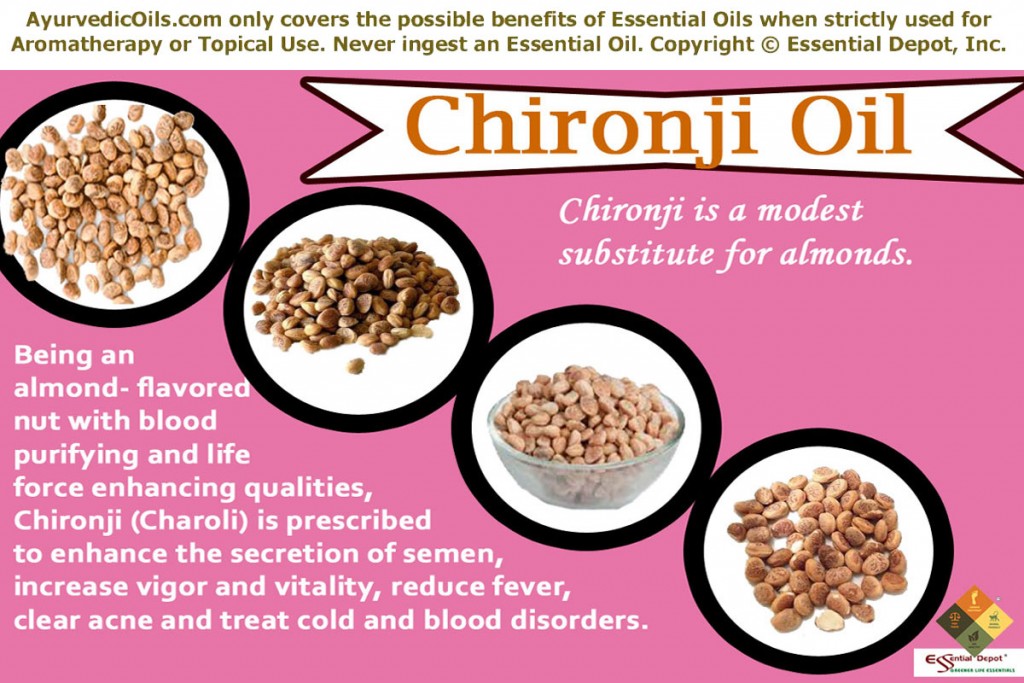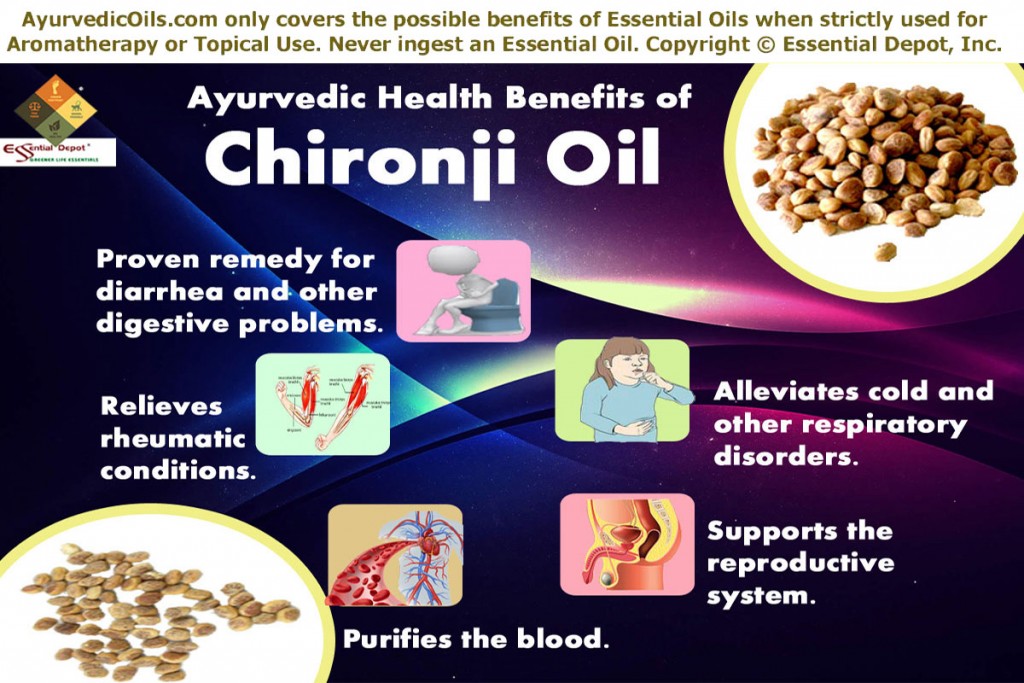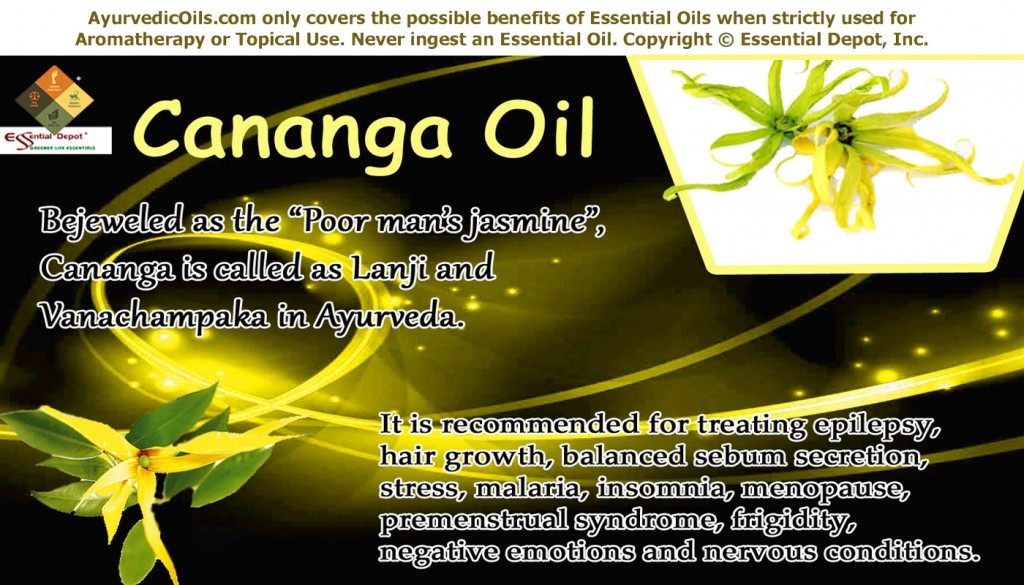Often used as a substitute for almonds, Chironji is an almond-flavored nut with blood purifying and life force enhancing qualities. Called as Charoli or Chironji in Ayurveda, these dried modest seeds have been in use in the Ayurvedic medicine for treating digestive disorders like diarrhea, ulcers and irregular bowel movements.
 It was also recommended to enhance the secretion of semen, increase vigor and vitality, reduce fever, clear acne, skin blemishes, cold and blood disorders. Chironji oil is extracted from the dried seeds by steam distillation method and is scientifically called as Buchanania lanzan.
It was also recommended to enhance the secretion of semen, increase vigor and vitality, reduce fever, clear acne, skin blemishes, cold and blood disorders. Chironji oil is extracted from the dried seeds by steam distillation method and is scientifically called as Buchanania lanzan.
Purchase Chironji Oil – Wholesale – CLICK HERE
Historical importance and uses of Chironji:
Chironji is a medium-sized evergreen tree that grows up to 15m height. This tree is indigenous to India and is found growing widely in Nepal, Malaysia and Burma. The dry forests of Madhya Pradesh, Mirzapur and Varanasi districts of Uttar Pradesh, Jharkhand and Chattisgarh are the natural Chironji growing hubs of India. It is a member of the Anacardiaceae plant family and is also known as Almondette tree. Chironji is also called with other names such as ‘Cuddapah almond, Charooli, and Chirolo.’
The seed kernels of this tree contribute to about 52% of oil and are often used as a substitute for almond oil and olive oil. Chironji nuts gained favorable demand in the foreign market and has been nurtured by the Indian government as a reliable source of earning foreign exchange.
Ayurvedic medicine uses all the parts of this tree including its bark, fruits, roots, leaves, nuts and kernels for its varied medicinal properties in treating cold, bowel disorders, premature ejaculation, fever and rheumatism.
Charoli seeds are a popular ingredient in Indian sweets (Chironji ka Barfi, piyush, shrikhand, kheer and halwa), meaty kormas, lamb pepper with Chironji, Gajar ka Meetha, Hyderabadi Haleem, Charoli mutton, Malai kofta and as a flavoring for batters and sauces.
The gum extracted from the bark of this tree and powder of the roots and dried leaves mixed with buttermilk is a traditional remedy for treating diarrhea.
In the folklore medicine of Andhra Pradesh, Chironji gum was mixed with cow’s milk for relieving rheumatic pain and they also used the leaves as a tonic for supporting cardiac functions. The leaf powder was also used in encouraging quick healing of wounds.
Powdered seeds blended with milk and turmeric powder is used in India since as a natural face pack for augmenting the glow, complexion and suppleness of the skin. The juice or the decoction of the Chironji leaves is being used in Unani medicine for purifying the blood, treating loss of libido, impotency and also as a tonic for the digestive system.
Therapeutic properties and chemical constituents of Chironji oil:
The major therapeutic values of Chironji oil are carminative, expectorant, diuretic, aphrodisiac, relaxant, antiseptic, anti-inflammatory and stimulant. The chemical components of this oil are camphene, a-pinene, y-terpinene, b-pinene, myrcene, 8-cineole, sabinene and triglycerides like triolein, dipalmitoolein and dioleopalmitin.
Chironji seeds are a powerhouse of various nutrients like proteins, fiber, vitamin C, B1 and B2, carbohydrates, amino acid, iron, maleic acid, cardanol, linoleic acid, niacin, calcium and few water soluble extracts.
Ayurvedic health benefits of Chironji oil:
Ayurveda means ‘the knowledge of life’ and the greatest thing that has made this science as an admiration to the entire world is its disciplinary approaches that tend to mold the individual on all aspects of life including the physical, mental and attributes of the soul.
The most celebrated Ayurvedic Physician Mr. Vasant Lad says in his Textbook of Ayurveda as, “Ayurveda treats the whole person, not just the organ or system involved.”This clearly depicts that Ayurveda is a holistic healing science that deals with an individual and not just with his ailments.
It follows nature’s system of handling health and harmony leading to disease-free living, healthy aging and expanded life span. Ayurvedic healing identifies the root cause of an illness for preventing it in future and never believes in treating the symptoms alone. The National Institute of Health rightly quotes “The aim of Ayurvedic medicine is to integrate and balance the body, mind, and spirit. This is believed to help prevent illness and promote wellness.”
Ayurveda respects every individual as a unique creation and a vital part of nature. This makes the Ayurvedic treatment methods different for every individual even if a group of people are affected by same sickness.
The ancient Ayurvedic texts like Charaka Samhita and Sushruta Samhita say that all things in the universe are made up of five elements of nature namely water, earth, space, fire and air and every human being is distinct with a unique individual constitution, which comprises three biological energies known as doshas. These dynamic forces (doshas) are an arrangement of these vital elements.
Pitta dosha is a representation of fire and water and takes care of metabolism, cognitive functions and body temperature. Vata is a grouping of air and space and controls the working of the respiratory system, circulatory system and nervous system. Kapha dosha represents water and earth and is in charge of movement of fluids in the system, physical set up and nourishment.
Every person has a predominance of any one dosha, which decides their individuality and behavioral traits. Perfect balance between these doshas as per the natural set up denotes health and imbalance due to improper food habits, change in lifestyle and climatic conditions leads to illnesses.
Ayurveda recommends natural remedies like herbs, essential oils, Ayurvedic routine, yoga, simple physical exercises, prayers, Ayurvedic massage, meditation and Panchakarma (detoxification therapies) based on the individual constitution to treat imbalance of doshas. Chironji oil is said to pacify kapha and vata and has a neutral effect on pitta dosha.
Let’s take a look at the Ayurvedic health benefits of Chironji oil:
 1. Proven remedy for diarrhea and other digestive problems:
1. Proven remedy for diarrhea and other digestive problems:
Diarrhea is called as Atisara in Ayurveda and it can also be caused due to toxins and psychological factors. Generally, accumulation of dampness caused by pitta instills a mild tendency on the colon and causes diarrhea. Ayurveda states that diarrhea may also be due to high toxic deposits or ama in the system, accumulation of water and increased vata or air in the body.
Chironji oil has the tendency to reduce kapha and vata and helps in eliminating the toxins or ama in the body, excess air and water retention. Adding 3 drops of Chironji oil in cool bathing water can help in relaxing the lining of the stomach and intestines, binding the stools and regularizing the bowel movements.
Inhaling the aroma of this oil by adding 2 drops to your diffuser or vaporizer can aid in overcoming loss of appetite. Massaging your abdomen with 5 drops of Chironji oil mixed with 2.5 ml of coconut oil can improve metabolism by acting as a tonic for digestion. Drinking a glass of buttermilk seasoned with 1 teaspoon of cumin seeds and coriander leaves can be of great assistance in treating all kinds of digestive woes.
2. Alleviates cold and other respiratory disorders:
Common cold and respiratory problems in general occur due to the vitiation of kapha dosha, which is responsible for stagnation of water in the body, toxic deposits and development of phlegm and mucous in the system.
Chironji oil has expectorant properties with its power to decrease kapha energy. 2 to 3 drops of this oil added to steam inhalation and massaging your throat, chest and back with 2 drops of Chironji oil mixed with your vaporub can help in loosening the mucous and phlegm deposits, relieving chest congestion, nasal congestion and common cold accompanied with runny nose and watery eyes.
3. Supports the reproductive system:
Chironji oil is a time-honored remedy for treating problems associated with sexual and reproductive functions. These seeds have aphrodisiac properties that help in treating impotence, loss of libido, lack of sexual interest, premature ejaculation and boost strength. Chironji seeds are being used in Maharashtra, India in preparing sweets and nutritious drink for the newlywed couples to maintain vitality and enhance their reproductive ability.
Massaging your body with 20 drops of Chironji oil with 3 drops of Cinnamon oil and 2 drops of Ylang Ylang oil can help in augmenting your sexual interest, grant lasting pleasure, and treat premature ejaculation and impotency by increasing vigor and the count of blood cells.
Adding 3 drops of Chironji oil to your bathing water and 2 drops of Chironji oil with 2 drops of Rose oil put in your diffuser can grant peace, reduce fatigue and treat mood swings.
4. Purifies the blood:
Chironji is used in Unani medicine as a blood cleanser. It has a positive effect on the mind and body and enhances proper blood circulation. Stress and metal worries also contribute to building up of toxins by stimulating the secretion of cortisol, also known as stress hormone in the bloodstream.
A 2012 study on ‘Adaptogenic activity of methanolic extract of Buchanania lanzan’, an experimental study in the rat model concluded that Chironji has antistress or adaptogenic activity. Massaging your body with 10 drops of Chironji oil blended with 5 drops of Lavender oil and 10 ml of coconut oil helps in augmenting the count of blood cells, enhancing positive feelings, calming the mind and eliminating toxic substances in the blood.
5. Relieves rheumatic conditions:
Rheumatism is caused by kapha aggravation leading to sluggishness, water stagnation, building up of salt, uric acid, fatty substances and toxins especially in the joints causing swelling, pain, redness and irritation. Chironji oil reduces kapha dosha and assists in discharging excess deposits of water, uric acid, salt and toxins in the body through urine.
Its diuretic properties promote the quality and frequency of urination and its anti-inflammatory along with its analgesic attributes aid in reducing swelling and pain associated with rheumatism. Massaging the affected parts with 5 drops of Chironji oil, 2 drops of Peppermint oil along with 4 ml of sesame oil can assist in alleviating rheumatic problems.
Other health benefits:
Chironji oil is also used in treating wounds, fever, ulcers, pimples, skin blemishes, glandular swelling of the neck, itching, exhaustion and biliousness.
Disclaimer:
This piece of writing is only for the purpose of education and is written wholly in the concern of sharing the long-established insight of Ayurveda, the mother of all healing sciences. It is not intended to prevent or diagnose any disease or health conditions or to substitute any kind of expert medical advice or prescribed medications.
Do not use essential oils internally. Always ensure that you dilute essential oils in suitable carrier oils before using it for topical application, as pure and organic essential oils are highly concentrated substances. Consult your healthcare professional/Ayurvedic practitioner before choosing the right essential oil for your unique individual constitution and medical condition.
Thought for the day:
Nature does not hurry, yet everything is accomplished. -Lao Tzu
Suggested Reading:
- The Secret to Great Health – The Vedic Health Code by Swami Ram Charran
- The Modern Ayurveda: Milestones Beyond the Classical Age from CRC Press
- Handbook of Nuts: Herbal Reference Library by James A. Duke
- Unsaponifiable Matter in Plant Seed Oils by Didier Fontanel
Reference Links:
- Buchanania lanzan by Wikipedia
- Charoli by Only Foods.net
- Diarrhea by Baidyanath Ayurveda
- Chironji nut (Buchanania lanzan) processing, present practices and scope by the Agricultural and Food Engineering Department, Indian Institute of Technology, West Bengal published in the Indian Journal of Traditional Knowledge
- Adaptogenic activity of methanolic extract of Buchanania lanzan leaves an experimental study in rat model by Shalini Kapoor Mehta, Navpreet Bains and Naira Nayeem, GHG Khalsa College of Pharmacy, Ludhiana published in Pelagia Research Library




